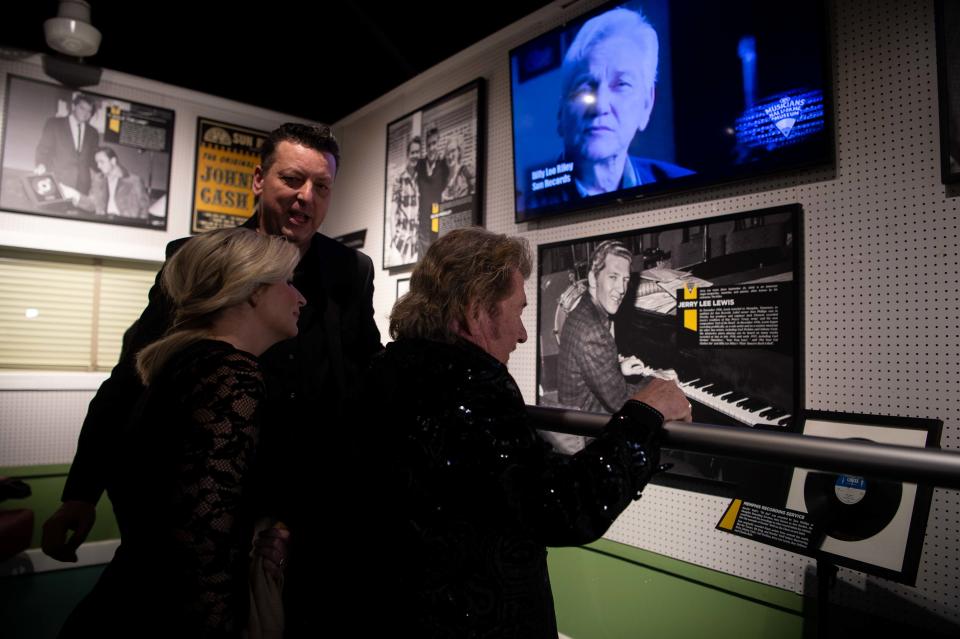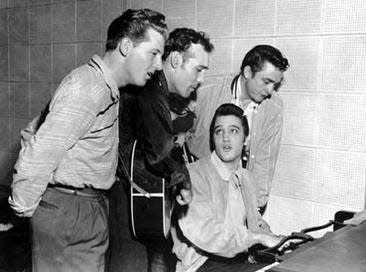Sam Phillips' son Jerry talks about his father, Sun Records and Memphis' rock 'n' roll legacy
- Oops!Something went wrong.Please try again later.
- Oops!Something went wrong.Please try again later.
- Oops!Something went wrong.Please try again later.
Nashville's Musicians Hall of Fame and Museum has re-opened after flooding at the adjacent Municipal Auditorium closed the venue for the month of January.
The reopening coincides with what would have been the 100th birthday of Memphis and rock 'n' roll icon Sam Phillips — the founder of the legendary label Sun Records.
To celebrate, Phillips' son Jerry Phillips, a guitarist, producer, singer and songwriter with decades of experience, was present Wednesday evening to highlight the museum's showcase dedicated to the label founded in 1952.
In conversation with The Tennessean, it's clear that Jerry Phillips still feels as passionately attached to his timeless blond jelly roll pompadour hairstyle as he is to his father's creative legacy.
That legacy is best understood by diving into the component parts of the sonic bridge from folk-to-blues-to-rock at the core of rock 'n' roll's three-quarters of a century existence.
Super Bowl: The Nashville artists we want to see headline halftime
More:Tony Evans Jr. creates space for country-defined R&B in the pop landscape
The conversation with Phillips is especially noteworthy in an era where modern country music — on the backs of rising female stars such as Elle King and Lainey Wilson — is moving in a direction where the elements that bridged the gaps between these tent-post genres are once again in vogue.
Foremost, the constant redevelopment of the crossover spaces between race, gender and social class for rock-influenced popular music is intrinsic to why Sam Phillips initially involved himself in the music industry.
His son notes that fundamental to the success of Sun Records in recording many iconic tracks — from Ike Turner and the Kings of Rhythm's "Rocket 88" to Carl Perkins' "Blue Suede Shoes" and others from B.B. King, Howlin' Wolf and Little Milton — is the actual Memphis Recording Service building on 706 Union Ave.
The purpose of the actual studio serving as a space in the segregated South where Phillips' skills as a recording engineer were used by Black artists needing recording booths to develop their art is important.
Jerry Phillips recalls his father telling him of his sharecropping roots, alongside Black workers who taught him that Black and white field hands did labor with a different type of rhythm and swagger. Phillips, as a music producer and engineer, ultimately set forth at Memphis Recording Service to capture that inimitable style in recordings.
"My father felt that [that rhythm and swagger] were inspired by the blues, hardships and sorrows that Black people were enduring," says Phillips.

He also notes that as a white person who worked next to Black people in cotton fields, "you couldn't help but pick up on [that vibe that Black sharecroppers had]. Anyone — not just Black people — who dragged a cotton sack around and worked doing hard, manual labor — who also wanted to make records — in my father's mind, deserved the chance to record themselves to be seen and heard."
His father originally wanted to be a criminal defense lawyer, Phillips recalls.
"He always wanted to fight for the underdog," he says.
That kind-hearted but justice-minded and equity-driven spirit is, according to Phillips, what started his father's policy of allowing musicians to audition for free at Sun Records. Only if he liked what he heard would he then cut a record on someone.

Those records were recorded on a mono audio-tracking device in single-take formats. Raw, oftentimes mistake-laden final tracks were released to the world. Superseding polished production is what Phillips calls the "feel" of the record.
No four artists who recorded at Sun Records better exemplified the pop-crossover feel of what developed into rock 'n' roll than Johnny Cash, Jerry Lee Lewis, Carl Perkins and Elvis Presley — a foursome referred to as the "Million Dollar Quartet" after the young Southern musicians gathered for a recording session witnessed by a Memphis Press-Scimitar reporter in 1956.
"Four superstars combined forces and elevated each other's work to achieve being [The Million Dollar Quartet]," Phillips stated.
Looking at the work of Cash, Lewis, Perkins and Presley from the perspective of raw new talents instead of the refined superstars they eventually became is only possible through the lens of someone more connected with their roots than their hall of fame legacies.

"Four farm boys showing up at the studio to cut records, but having the luck of meeting up with a producer who could understand the uniqueness of their creativity and soul, allowed that success to occur. As soon as they opened their mouths, they were unmistakable and undeniable. "
Presley's emergence created what Phillips calls a "conduit for rock's crossover." Contemplating the meaning of what that crossover has created in the seven decades since offers Phillips reason to pause.

"Many people didn't like my father because of what he accomplished — from both a musical and social standpoint. His independent spirit continues to inspire people to approach making rock 'n' roll in one way, as he once noted to a band's manager during a party."
Building into the punchline, Phillips winks:
"My father told that Englishman that making rock 'n' roll requires reaching deep down inside yourself and pulling it from out of your a--hole."
The rock 'n' roll that Sam Phillips and Sun Records' legacy has provided the world is still as freewheeling, human, iconoclastic and rough as ever.
This article originally appeared on Nashville Tennessean: Sam Phillips' son Jerry Phillips on Sun Records and father's legacy

